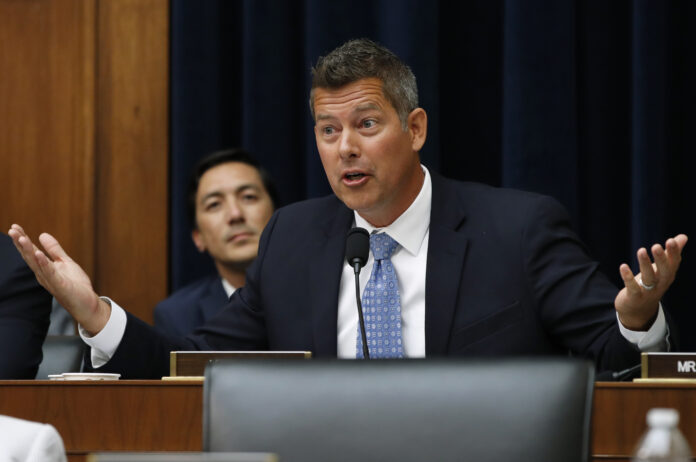|
Getting your Trinity Audio player ready...
|
Transportation Secretary Sean Duffy Slams MTA Over Pro-Hamas Protest at Grand Central: A War of Words Over Safety, Accountability, and Antisemitism
Edited by: Fern Sidman
A fierce public confrontation has erupted between U.S. Transportation Secretary Sean Duffy and the New York State Metropolitan Transportation Authority (MTA) following a controversial demonstration by pro-Hamas activists at Grand Central Terminal in Manhattan. The incident, which took place Monday evening, drew widespread criticism for what Duffy characterized as a failure by the MTA and New York authorities to prevent a disruptive and, in his words, “antisemitic mob” from endangering public safety and paralyzing a major transportation hub.
As reported by the Jewish News Syndicate (JNS), Duffy condemned both the protesters and local leadership in sharp terms, blaming them for allowing what he perceived as a volatile and threatening environment to flourish in one of the most densely populated areas of New York City.
“Disgusting. These antisemitic mobs shutting down transit centers need to be condemned, and the organizers should be held accountable,” Duffy declared on social media. “New York City commuters are already afraid of being the next assault victim. Now, they have to worry about pro-Hamas agitators. Enough is enough.”
Duffy went on to criticize the MTA’s handling of the event, questioning how demonstrators were able to gather in Grand Central at all. JNS reported that his criticism extended to New York Governor Kathy Hochul, whom he accused of silence in the face of mounting antisemitic harassment: “Where is MTA? Why were these people able to suspend service at oneof the biggest transportation hubs in America? Where is the condemnation from Gov. Kathy Hochul?”
In response, the MTA pushed back swiftly with a “fact check” posted to social media. The report on JNS said that Michael Kemper, the MTA’s chief of security, emphasized that Grand Central Terminal was never officially shut down and that transit service remained operational throughout the demonstration.
“Police officers routinely prepare for all types of scenarios, and this was no different,” Kemper stated. “Demonstrators were confronted, ordered to leave, and those who failed to comply were arrested.”
According to the New York City Police Department, which spoke to JNS, two individuals were arrested in connection with the protest.
Unconvinced by the MTA’s explanation, Duffy doubled down, directly challenging the agency’s public narrative. “Service was not affected? Tell that to the Jewish Americans who feared for their lives while this went on,” he wrote in a follow-up post, the JNS report indicated. “This is why no one trusts the MTA to keep them safe anymore.”
Duffy went further, rejecting the MTA’s characterization of the protest as just another public demonstration: “By the way, this wasn’t a ‘scenario.’ It was an antisemitic mob. Condemn this for what it is, or else you’re enabling this harassment.”
The dispute has drawn commentary beyond New York. The JNS report noted that Debora Allen, a former board member of the Bay Area Rapid Transit (BART) system in California, echoed Duffy’s concerns, warning that such incidents could set a troubling precedent for public transit systems nationwide: “Is this what we have to look forward to in BART and other Bay Area transit?” she wrote. “Note the response from MTA, replying nothing was shut down, nothing to see here. Typical transit spin.”
In a follow-up statement to JNS on Wednesday, an MTA spokesperson reiterated the agency’s stance, saying that allegations of service disruption were “inaccurate” and that the terminal remained operational despite the protest.
The broader political and cultural context of this incident cannot be ignored. As JNS reported, the protest at Grand Central comes amid rising concerns over antisemitic rhetoric and violence both domestically and abroad, particularly since the onset of the Israel-Hamas war. Jewish communities across the U.S. have voiced alarm over hostile protests, vandalism, and verbal harassment, often disguised as political expression but veering into intimidation.
Duffy’s remarks reflect the federal government’s growing scrutiny of how local authorities respond to public safety threats — especially those perceived as targeting Jews or fomenting unrest in sensitive public spaces.
The heated exchange between Duffy and the MTA — and the lack of a clear consensus about what happened inside Grand Central — points to a widening rift between federal and local leaders over how to balance First Amendment protections, public safety, and the urgent need to condemn antisemitism wherever it surfaces.
One thing is clear: what occurred at Grand Central Terminal was more than a protest. It has become a national flashpoint in the larger conversation about antisemitism, public accountability, and the right to safety in shared civic spaces.




